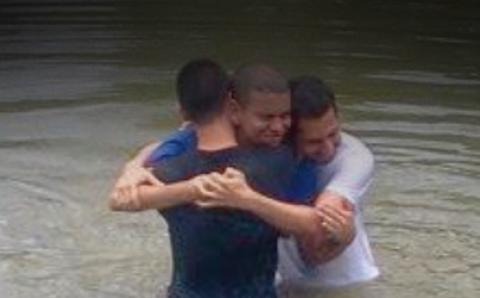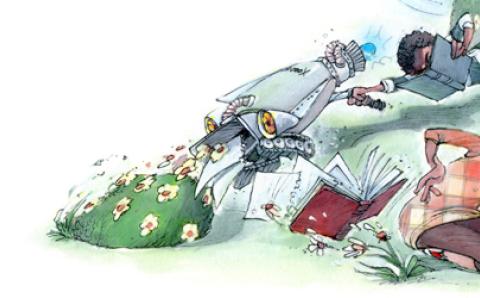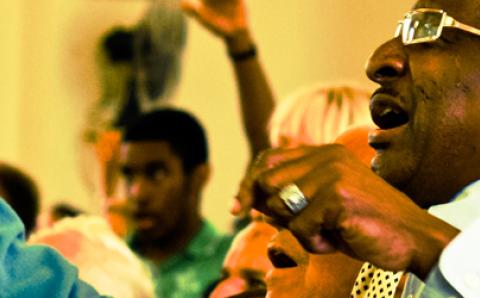I got my first hint that something Reformed was afoot at a major evangelical conference a few years back: a speaker was boosting an “all of life is redeemed” theology and flashed up a picture of Al Wolters’s book Creation Regained. And 5,000 teenagers screamed in unison. Al Wolters, I realized, is a rock star.
Neo-Calvinism, let’s call it “world-reforming Christianity,” has gotten sexy again—and nobody seems more surprised than actual Calvinists. The New York Times told us in January 2014, not for the first time, that evangelicals are finding themselves in “the midst of a Calvinist revival.” But where Mark Oppenheimer’s Times article gives the usual picture of Calvinists—as depraved little Christians and very, very sinful—it misses one of the causal links that is essential for understanding why this world-affirming, world-reforming Calvinism is making a big North American splash: its practical, public theology.
Practical Theology
You will notice I didn’t say its politics, which would be both too narrow and off base. Oppenheimer gets that part right: young evangelicals are overwhelmingly disillusioned with fractious partisan politics, more so in the U.S. than in Canada, which has dodged some of the more debased forms of the so-called “culture wars.” No, this Reformed Christianity is not nakedly political, partly because this sort of Calvinism teaches that politics is often downstream of culture, but partly also because the scale of political change, especially in the U.S., is dizzying and mystifying.
Times columnist David Brooks calls these young evangelicals “the Cynic Kids.” He writes that “the harsh events of the past decade may have produced not a youth revolt but a reversion to an empiricist mind-set.” These Cynic Kids, he says, “don’t like the system—however, they are wary of other alternatives as well as dismissive of their ability to actually achieve the desired modifications. As such, the generation is very conservative in its appetite for change” and “deeply resistant to idealism. Rather, the Cynic Kids have embraced the policy revolution; they require hypotheses to be tested, substantiated, and then results replicated before they commit to any course of action.”
Entitled, in other words, they are not. Just when the world badly needs the affluent, educated young to risk everything on an audacious idealism, something beyond themselves, beyond fear and uncertainty, beyond recessions and terrorism, First World problems are getting deadly serious.
Young evangelicals badly need a Christian theology that makes sense of this orgy of brokenness they are inheriting without turning them cold and cynical. They need, to quote Bob Goudzwaard, “hope in troubled times.”
Enter world-reforming Calvinism—“neo-Calvinism,” some say for short—and its practical theologies. It lacks the triumphalism and the culture-conquering religious wars of the last few decades, fueled as it is by its frank Augustinian confessions of sin and brokenness. Like our postmodern blockbusters—Game of Thrones, Breaking Bad, pick your HBO/AMC prime time award-winner—this Calvinism is earnest about feeling the painful, terrifying wounds of ourselves and our world.
It doesn’t offer escapism, it doesn’t offer conquest, at least not by us mere mortals. It is unflinching in its encounter with the world’s darkest places because it knows this is not the way it’s supposed to be. Calvinism’s practical theology answers the painful moral questions of the Cynic Kids while offering real evidence, real foretastes of hope for a better world. It is slow theology, working among the ruins—“proximate justice,” Steven Garber calls it—but it is resilient theology, theology manifest in outcomes, in malaria meds and clean water, in fair loans and growing businesses.
Public Impact
World-reforming Calvinism is finding its followers not firstly in doctrinal debate but through evidence-based practice. People are finding out about Calvin, about Kuyper and Bavinck, about Groen Van Prinsterer, and, yes, even Al Wolters (cue screams) by the public impact of their theology, not first by the ideas themselves. They see that slow, world-affirming, system-transforming impact and follow it back to its roots, where they find this unsuspecting cast of public theologians. In short, young evangelicals are arriving at neo-Calvinism by tasting its fruits and only later following it back through the root system.
Take a guy like Gary Haugen, president of the International Justice Mission. He opens his latest book, The Locust Effect, with a pure extract of terror and violence:
It was my first massacre site. Today the skulls are neatly stacked on shelves, but when we first encountered them, they definitely were not. They were attached to bodies—most skeletal remains—in a massive mess of rotting human corpses in a small brick church in Rwanda.
Gary has been in the dark. He knows it is hard, damnably difficult, to see justice done, and he knows what it looks like when it’s not. The Locust Effect is a powerful argument, cribbed straight from the pages of Abraham Kuyper in 1889: that wasting disease cannot be cured, no business grown, no right restored apart from a robust simultaneous realization of norms.
We cannot end poverty without ending violence. We cannot build business without addressing property rights. We must have not only personal virtue, but also public justice. Kuyper said, “we must courageously and openly acknowledge that the situation calls not only for the physician but most certainly for the architect as well.” Dietrich Bonhoeffer, pastor and martyr, gave it a more 20th-century spin: “We are not to simply bandage the wounds of victims beneath the wheels of injustice, we are to drive a spoke into the wheel itself.”
Bold words, and ones Haugen had in the back of his mind when he wrote the following in Foreign Affairs in 2010:
Given even a small fraction of the time and money that have been devoted to fixing roads, improving health systems, providing clean water, and building schools in developing countries, they will begin to enable the poor to retain the benefits of such development assistance. On behalf of the billions of poor people in this world who are made small under the vast shadow of lawlessness, the time has come to construct a shelter of justice.
Public justice is political, but it’s also more than that: it’s the social, cultural, and religious virtue that makes the political possible. It is, in the words of Mike Gerson, the architect of PEPFAR (the President’s Emergency Plan for AIDS Relief), “the banality of goodness”—of small, repeated, habituated, ritual acts of long obedience.
And it’s what Jamie Smith calls “loving faithful institutions” in his bracing manifesto in last fall’s Comment magazine. He says young evangelicals are dabbling, experimenting with institutions because they see the lasting power of those social forms, both in the destruction they bring when systems behave badly, and in the renewal when systems are restored. “Institutions,” he says, “are ways to love our neighbors. Institutions are durable, concrete structures that—when functioning well—cultivate all of creation’s potential toward what God desires—shalom, peace, goodness, justice, flourishing, delight.”
We who are already Reformed have a taste of that kind of good inheritance passed down in the structures of churches, of colleges, retirement homes, aid agencies, think tanks, and more. As it turns out, “they’ll know we are Christians by our love” is just a good paraphrase of “they’ll know we’re Reformed by our institutions.”
Web Questions:
- Secular media, including the New York Times, have pointed out that evangelicals are “in the midst of a Calvinist revival.” Joustra calls this neo-Calvinism “world-reforming Christianity.” How would you define it? What are some of the characteristics of this brand of Christian theology?
- “Young evangelicals badly need a Christian theology that makes sense of this orgy of brokenness they are inheriting without turning them cold and cynical,” says Joustra. How does Calvinism meet this need?
- Joustra talks about Calvinism as a “practical theology.” What are some ways you see this theology manifested in your neighborhood? Your country? The wider world?
- “We must have not only personal virtue, but also public justice.” Discuss whether you see this insight as peculiarly Reformed. Why or why not?
- Joustra says, “they’ll know we are Christians by our love” is just a good paraphrase of “they’ll know we’re Reformed by our institutions.” How do institutions like churches, schools, and relief organizations help us cultivate God’s kingdom?
About the Author
Robert J. Joustra is a professor of Politics &International Studies at Redeemer University. He is the editor, with Jessica Joustra, of Calvinism for a Secular Age, and many other books on religion &politics. He is a member and elder at Immanuel Christian Reformed Church.








